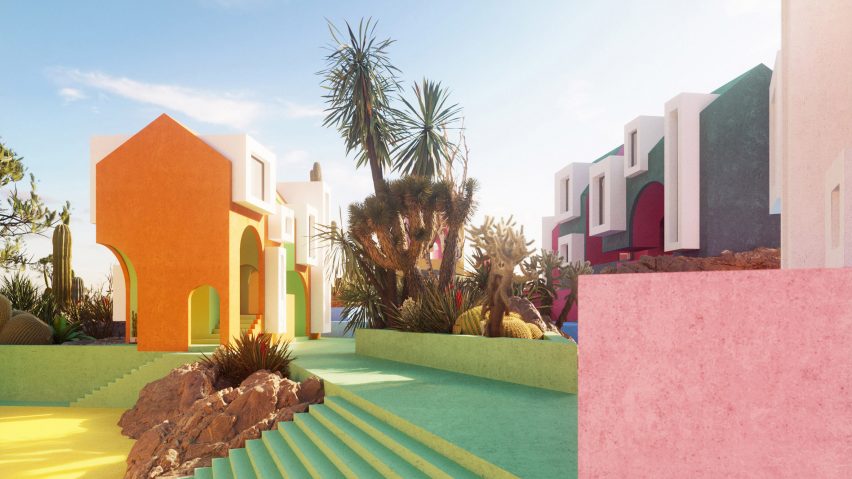Moscow siblings Davit and Mary Jilavyan spent the coronavirus lockdown creating renderings of an imaginary community in Mexico with two-toned buildings and streets dotted with cacti and swimming pools.
Architect and visualizer Davit worked with his sister Mary, who is a 3D designer, to create the computer images during the Covid-19 pandemic for a community in a nondescript, arid site with hills.
The buildings feature bright pink, green, orange, blue and yellow exteriors that take cues from works by Mexican architect Luis Barragán and Spanish architect Ricardo Bofill, who are both known for their use of bold colours.
The images show that as the sun rises and sets across the landscape, the colours of the town change in saturation and hue.
Many of the houses are two- or three-storeys, and walkways meander around barrier walls and boulders that are planted with cacti and flowers bushes. Home at the perimeter have views to the rocky desert and horizon beyond.
"In Sonora Art Village there is no clear system, the houses are located chaotically, each house has its own colourful path," Davit and Mary Jilavyan said. "Some houses are higher, some are lower, so the village has a lot of small stairs, which makes it feel like you're going up and down in a game like Super Mario."
Arches, passageways and overhanging volumes add to the geometry of the concept, while zig-zagging pathways and steps pass by the homes and link them together for a walkable scheme. Plazas, lounge areas, outdoor swimming pools and basketball courts round out the proposal.
The Jilavyans created the imaginary Sonora Art Village while in coronavirus lockdown in Moscow and said the project's brightness and creativity give them a sense of relief and happiness.
"Sitting in self-isolation, surrounded by four walls, it occurred to us to create a whole village from houses like Sonora House," the duo added. "We wanted to create a place where people can come and feel for a while in a completely different place, far from the grey reality, to feel in some bright 3D space or even a cartoon."
Aside from the isolation they experience currently and the sense of community the project provides, the design also offers a feeling of freedom.
"Sonora Art Village is an explosion of our emotions, it's what we lack in reality," they said. "It's a place free from prejudice. There's no place for racism, sexism, humiliation. We tried to create a completely different atmosphere that would exude joy, love and happiness."
The development came about after a friend from Mexico first tasked them to make a colourful house for a family named Sonora House, which featured a gabled roofline and white windows that pop out from the facade.
"Thanks to the way our house was warmly welcomed, we thought that maybe we should continue this idea, and came up with a whole village of similar houses, where people can relax," they said. "Our goal was to do something as simple as last time but unusual."
"This is just a concept, non-commercial, just a piece of art," they added. "But we would be happy if one day our project became a reality to let people dive into a completely different atmosphere."
The Jilavyans are among a wave of visual artists that have created utopian landscapes, buildings and interiors for armchair escapists during the coronavirus pandemic.
Others include interior designer and creative director Charlotte Taylor, who collaborates with a roster of 3D artists to realise imaginary spaces. She told Dezeen that these type of projects "feed into people's imaginations and appetite for a change of scenery, be it completely impossible or not".
A number of similar creative projects have been borne out of the coronavirus lockdown like Invisible Cities by artists Camille Benoit and Mariana Gella, which are architectural models of fantastical cities made from paper and tools they had at home.
New York designer Eny Lee Parker also developed an Instagram competition tasking people to model tiny clay versions of their ideal homes. Parker kicked off the Clay Play contest with her polymer clay creation and then called for others to make their "ideal room".

